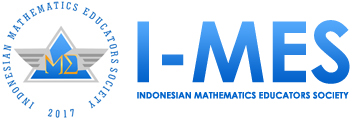Fostering Mathematical Motivation with Wordwall Media: A Study of the ARCS Model (Attention, Relevance, Confidence, and Satisfaction) Based on Sex Among High School Students
DOI:
https://doi.org/10.35706/sjme.v8i2.11186Abstract
This research is motivated by concerns about low student motivation in the educational environment. The main objectives of this study are: 1) to understand the level of motivation among the majority of high school students in Lebak Banten Regency in learning mathematics using the Wordwall media; 2) to explore differences in the level of student motivation based on the ARCS model in mathematics learning utilizing the Wordwall media, considering sex factors; 3) to analyze the percentage of each ARCS aspect contributing to the level of motivation in mathematics learning using the Wordwall media; 4) to identify how the percentage of each ARCS aspect affects the level of motivation in mathematics learning using the Wordwall media, considering sex differences; 5) to examine the influence of Wordwall-based mathematics learning on sex-based motivation seen from the ARCS model. The research method used is quantitative with a quasi-experimental approach and a One-Group Pretest-Posttest research design. The data analysis results show that female students' motivation tends to be higher than that of male students, with the motivation percentage of female students being higher in each aspect of ARCS motivation. The Satisfaction aspect has the highest percentage, which is 78.53%. There is a significant increase in the motivation of male and female students from pretest to posttest. The increase is seen in all four aspects of ARCS motivation. In male students, there is an increase from an average of 47.36% to 75.00%, while in female students, there is an increase from 54.25% to 83.16%. Additionally, there is an influence before and after Wordwall-based mathematics learning based on sex seen from the ARCS model
Downloads
References
Afifa, M. N., Wardono., & Waluya, S. B. (2023). Systematic Literature Review: Kemampuan Literasi Matematika Siswa ditinjau dari Motivasi Belajar pada Pembelajaran Matematika. Prosiding Seminar Nasional MIPATI, 2(1), 126-137. Retrieved from https://jurnal.stkipbjm.ac.id/index.php/mipati/article/view/2577
Akmalia, R., & Ulfah, S. (2021). Kecemasan dan Motivasi Belajar Siswa SMP Terhadap Matematika Berdasarkan Sex di Masa Pandemi COVID-19. Jurnal Cendekia : Jurnal Pendidikan Matematika, 5(3), 2285–2293. https://doi.org/10.31004/cendekia.v5i3.846
Akmalia, R., & Ulfah, S. (2021). Kecemasan dan Motivasi Belajar Siswa SMP Terhadap Matematika Berdasarkan Sex di Masa Pandemi COVID-19. Jurnal Cendekia: Jurnal Pendidikan Matematika, 5(3), 2285–2293. https://doi.org/10.31004/cendekia.v5i3.846
Amelia, I., Pujiastuti, H., Fathurrohman, M., Santosa, C. A. H. F., & Fatah, A. (2023). Systematic Literatur Review: Kemampuan Literasi Matematis Ditinjau dari Motivasi Belajar Matematika. JIIP-Jurnal Ilmiah Ilmu Pendidikan, 6(2), 811–818. https://doi.org/10.54371/jiip.v6i2.1281
Arimbawa, I. G. P. A. (2021). Penerapan Wordwall Game Quis Berpadukan Classroom untuk Meningkatkan Motivasi dan Prestasi Belajar Biologi. Indonesian Journal of Educational Development (IJED), 2(2), 324-332. https://doi.org/10.5281/zenodo.5244716
Audia, C., Yatri, I., Aslam, Mawani, S., & Zulherman. (2021). Development Of Smart Card Media for Elementary Students. Journal Of Physics: Conference Series, 1783(1), 012114. http://dx.doi.org/10.1088/1742-6596/1783/1/012114
Chen, C., et al. (2021). Using Digital Technology to Enhance Problem-Solving Skills in Mathematics Education. Journal of Computers in Education, 8(1), 159–175.
Fitriah, L. (2018). Motivasi Belajar Mahasiswa Prodi Tadris Fisika UIN Antasari Banjarmasin pada Perkuliahan Fisika Dasar 1 dalam Setting Strategi Motivasi ARCS. Berkala Ilmiah Pendidikan Fisika, 6(2), 157. https://doi.org/10.20527/bipf.v6i2.4917
Gandasari, P., & Pramudiani, P. (2021). Pengaruh Aplikasi Wordwall terhadap Motivasi Belajar IPA Siswa di SD. Edukatif: Jurnal Ilmu Pendidikan, 3(6), 3689-3696. https://doi.org/10.31004/edukatif.v3i6.1079
Handayani, S., Marlina, M., & Desyandri, D. (2021). Faktor yang Mempengaruhi Motivasi Belajar Siswa Sekolah Dasar pada Masa Pandemi Covid-19. Jurnal PAJAR (Pendidikan dan Pengajaran), 6(1), 125-131. http://dx.doi.org/10.33578/pjr.v6i1.8425.
Harahap, H. F., Sabrina, D. (2021). Article Analysis of Motivation Methods and Student Learning. Indonesian Journal of Intelectual Publication, 1(3), 198–203.
http://journal.intelekmadani.org/index.php/ijipublication/article/view/121
Johnson, B., & Johnson, R. (2020). The Power of Interactive Learning: Overcoming Obstacles and Enabling Excellence. Educational Technology Research and Development, 68(5), 2245–2265.
Kanda S, A. S. (2020). Mengembangkan Kemampuan Pemahaman dan Bepfikir Kreatif Matematik Serta Motivasi Belajar Mahasiswa Melalui Penerapan Aplikasi Statistics Quick. SJME (Supremum Journal of Mathematics Education), 4(2). https://doi.org/10.35706/sjme.v4i2.3648
Kaur, T., & Prendergast, M. (2022). Students’ Perceptions of Mathematics Writing and its Impact on Their Enjoyment and Self-Confidence, Teaching Mathematics and its Applications: An International Journal of the IMA, 41(1), 1–21, https://doi.org/10.1093/teamat/hrab008
Launin, S., Nugroho., & Angga, S. (2022). Pengaruh Media Game Online Wordwall untuk Meningkatkan Minat Belajar Siswa Kelas IV. Jurnal Pendidikan dan Ilmu Sosial. 1(3), 216- 223. https://doi.org/10.55784/jupeis.Vol1.Iss3.176
Leni, N. (2019). Faktor Yang Membuat 7 Negara (Finlandia, Korea Selatan, Hongkong, Jepang, Singapura, Belanda, Kanada) Diakui Memiliki Sistem Pendidikan Terbaik di Dunia dalam Kajian Antropologi dan Matematika. Prosiding Seminar Nasional UIN Lampung. 219-229.
Lestari, K. E., & Yudhanegara, M. R. (2017). Penelitian Pendidikan Matematika (2nd ed.). Bandung: PT Refika Aditama.
Liberna, H., & Seruni. (2022). Pengaruh Motivasi Belajar dan Curiosity Terhadap Kemampuan Berpikir Kreatif Matematis Siswa SMP Swasta di Kabupaten Bogor. Prosiding Diskusi Panel Nasional Pendidikan Matematika, 135-142.
Mardhiah, A., & Akbar, S. A. (2018). Efektivitas Media Pembelajaran terhadap Hasil Belajar Kimia Siswa SMA Negeri 16 Banda Aceh. Lantanida Journal, 6(1), 49-58. http://dx.doi.org/10.22373/lj.v6i1.3173
Maretta, N.W., Kamila, U., Fajri, Y.I., & Susilo, B.E. (2024). Studi Literatur: Efektivitas Pembelajaran Matematika Pasca Pandemi dalam Mendorong Motivasi Belajar Siswa. PRISMA, Prosiding Seminar Nasional Matematika 7, 841-846
Nafi’ah, T. (2021). Upaya Peningkatan Aktivitas dan Hasil Belajar Tajwid Melalui Model Card Sort Berbasis Wordwall Siswa Kelas IV MI Plus Bunga Bangsa. [Institut Agama Islam Negeri Ponorogo]. http://etheses.iainponorogo.ac.id/15546
Napitupulu, R. M. (2020). Dampak pandemi Covid-19 terhadap Kepuasan Pembelajaran Jarak Jauh. Jurnal Inovasi Teknologi Pendidikan, 7(1), 23–33. https://doi.org/10.21831/jitp.v7i1.32771
Nissa, F. Z & Renoningtyas, N. (2021). Penggunaan Media Pembelajaran Wordwall untuk Meningkatkan Minat dan Motivasi Belajar Siswa pada Pembelajaran Tematik di Sekolah Dasar. Jurnal Ilmu Pendidikan, 3(5), 2854-2860. https://doi.org/10.31004/edukatif.v3i5.880
Nissa, I. C., Febrilia, B. R. A., & Astutik, F. (2021). Perspektif Siswa Terhadap E-Learning Berdasarkan Model Motivasi ARCS. Media Pendidikan Matematika, 9(1), 19.
https://doi.org/10.33394/mpm.v9i1.3831
Nur, A. S., & Palobo, M. (2018). Profil Kemampuan Pemecahan Masalah Matematika Siswa ditinjau dari Perbedaan Gaya Kognitif dan Sex. Kreano, Jurnal Matematika Kreatif-Inovatif, 9(2), 139–148. http://journal.unnes.ac.id/nju/index.php/kreano%0AProfil
Oktiani, I. (2017). Kreativitas Guru dalam Meningkatkan Motivasi Belajar Peserta Didik. Jurnal Kependidikan, 5(2), 216–232. https://doi.org/10.24090/jk.v5i2.1939
Permana, S. P., & Kasriman, K. (2022). Pengaruh Media Pembelajaran Wordwall terhadap Motivasi Belajar IPS. Jurnal Basicedu, 6(5), 7831–7839. https://doi.org/10.31004/basicedu.v6i5.3616
Pradani, T. G. (2022). Penggunaan Media Pembelajaran Wordwall untuk Meningkatkan Minat dan Motivasi Belajar Siswa pada Pembelajaran IPA di SD. Educenter: Jurnal Ilmiah Pendidikan, 1(5), 452–457. https://doi.org/10.55904/educenter.v1i5.162
Putra, H. D., Putri, W. A. S., Fitriana, U., & Andayani, F. (2018). Kemampuan Pemecahan Masalah Matematis dan Self-Confidence Siswa SMP. SJME (Supremum Journal of Mathematics Education), 2(2), 60–70. https://doi.org/10.35706/sjme.v2i2.1313
Putri, C. N., & Hakim, D. L. (2022). Dimensi Math Anxiety (Kognitif, Sikap, Somatik) terhadap Kemampuan Pemahaman Konsep Matematis pada Materi SPLTV. PHI: Jurnal Pendidikan Matematika, 6(2), 159-167. http://dx.doi.org/10.33087/phi.v6i2.248
Rahmah, H., Turmudi, T., & Ghifari, M. T. (2023). Systematic Literature Review: Kepercayaan Diri dalam Pembelajaran Matematika. JPMI – Jurnal Pembelajaran Matematika Inovatif, 7(1), 97-110. https://doi.org/10.22460/jpmi.v7i1.21632
Rismawati, M., & Khairiati, E. (2020). Analisis Faktor yang Mempengaruhi Rendahnya Motivasi Belajar Siswa pada Mata Pelajaran Matematika. J-PiMat Jurnal Pendidikan Matematika, 2(2). 203-212. https://doi.org/10.31932/j-pimat.v2i2.860
Saragi, D. M. P., & Suryani, R. (2018). Perbedaan Motivasi Belajar Siswa Berjenis Kelamin
Perempuan dan Laki-Laki SMK Swasta Bandung. Jurnal Penelitian Bimbingan Dan Konseling, 3(1). https://doi.org/10.30870/jpbk.v3i1.3197
Sari, N., Suryanti, K., Manurung, S. M., & Sintia. (2017). Analisis Penggunaan Media Pembelajaran untuk Meningkatkan Motivasi Peserta Didik Terhadap Pembelajaran Fisika Kelas XI MIPA 1 SMA Titian Teras Muaro Jambi. Jurnal Pendidikan Fisika dan Keilmuan. 3(2): 110-112. http://doi.org/10.25273/jpfk.v3i2.1297
Sari, P. M., & Yarza, H. N. (2021). Pelatihan Penggunaan Aplikasi Quizizz dan Wordwall pada Pembelajaran IPA Bagi Guru-Guru SDIT Al-Kahfi. SELAPARANG Jurnal Pengabdian Masyarakat Berkemajuan, 4(2), 195. https://doi.org/10.31764/jpmb.v4i2.4112
Schukajlow, S., & Pekrun, K. R. R. (2017). Emotions and Motivation In Mathematics Education: Theoretical Considerations and Empirical Contributions. ZDM, 49(3), 307–322. https://doi.org/10.1007/s11858-017- 0864-6
Septiyan, I., & Pujiastuti, H. (2019). Motivasi Belajar Matematika Siswa Pondok Pesantren Modern Berdasarkan Perbedaan Sex: Studi Kasus pada Siswa Assaadah. Jurnal Analisa, 5(1), 51-58. https://doi.org/10.15575/ja.v5i1.3947
Setyowati, D., Qadar, R., Efwinda, S. (2022). Analisis Motivasi Siswa berdasarkan Model ARCS (Attention, Relevance, Confidence, and Satisfaction) dalam Pembelajaran Fisika berbasis E-learning di SMA seSamarinda. Jurnal Literasi Pendidikan Fisika, 3(2), 116 - 129. Retrieved from http://jurnal.fkip.unmul.ac.id/index.php/JLPF
Sholichah, F. M., & Aini, A. N. (2022). Math Anxiety Siswa: Level dan Aspek Kecemasan Serta Penyebabnya. Journal Of Mathematics Learning Innovation (JMLI), 1(2), 125-134. https://doi.org/10.35905/jmlipare.v1i2.4374
Sihombing, S., Silalahi, H. R., Sitinjak, J. R., Tambunan, H., & Hutauruk, A. (2021). Analisis Minat dan motivasi Belajar, Pemahaman Konsep dan Kreativitas Siswa terhadap hasil Belajar Siswa dalam Materi Geometri Selama Pembelajaran dalam Jaringan kelas X SMA Kota Medan. SEPREN: Journal of Mathematics Education and Applied, 2(2), 50 – 66. https://doi.org/10.36655/sepren.v2i2.555
Smith, A., & Dillon, R. (2019). The Effects of Interactive Whiteboard Instruction on Engagement and Learning. Journal of Educational Psychology, 111(4), 681–696. http://dx.doi.org/10.1109/ISET.2019.00065
Sukarno, S., & Salamah, S. (2019). Pengaruh Model Pembelajaran ARCS (Attention, Relevance, Confidence, Satisfaction.) dan Motivasi Terhadap Hasil Belajar IPS Siswa Kelas V SD Negeri 75 Kota Bengkulu. At-Ta’lim: Media Informasi Pendidikan Islam, 18(1), 137.
https://doi.org/10.29300/attalim.v18i1.1867
Tobamba, E. K., Siswono, E., & Khaerudin, K. (2019). Pengaruh Media Pembelajaran Terhadap Hasil Belajar IPS ditinjau dari Minat Belajar Siswa Sekolah Dasar. Taman Cendekia: Jurnal Pendidikan Ke-SD-an, 3(2), 372–380. https://doi.org/10.30738/tc.v3i2.5210
Trisnawati, T. ., Kusuma, V. V. ., & Yulianto, D. . (2023). Efektivitas Metode Tutor Sebaya Berbasis Youtube dalam Meningkatkan Kemampuan Number Sense Matematis Siswa ditinjau dari Perbedaan Jenis Kelamin Pada Materi Bilangan. Jurnal Lebesgue: Jurnal Ilmiah Pendidikan Matematika, Matematika dan Statistika, 4(1), 7-22. https://doi.org/10.46306/lb.v4i1.209
Walidah, G. N., A. Mudrikah., dan Samnur, S. (2022). Pengaruh Penggunaan Game Edukasi Wordwall terhadap Motivasi dan Hasil Belajar Matematika Siswa. UJMES: Uninus Jurnal of Mathematics Education and Science. 7(2): 105-115. https://doi.org/10.30999/ujmes.v7i2.2140
Wang, Y., & Shih, Y. (2018). Exploring the Impact of Interactive Whiteboards on Student Learning and Satisfaction: A Meta-Analysis. Computers & Education, 123, 1–13.
Yaniawati, P., Kariadinata, R., Sari, N. M., Pramiarsih, E. E., & Mariani, M. (2020). Integration of e-Learning for Mathematics on Resource-Based Learning: Increasing Mathematical Creative Thinking and Self-confidence. International Journal of Emerging Technologies in Learning (iJET), 15(06), pp. 60–78. https://doi.org/10.3991/ijet.v15i06.11915
Yanti, Y. E. (2020). Analisis Motivasi Belajar Mahasiswa Calon Guru Sekolah Dasar (PGSD) Pada Mata Kuliah Konsep Dasar IPA. Jurnal PGSD STKIP PGRI BANJARMASIN, 2(1), 320–334. https://doi.org/10.33654/pgsd
Yulianto, D. (2022). Analisis Kemampuan Pemecahan Masalah Siswa SMA Se-Kabupaten Tangerang pada Penyelesaian Soal AKM Berdasarkan Tahapan Polya. Geomath: Jurnal Pendidikan Matematika, 3(1), 1-22. https://doi.org/10.55171/geomath.v3i1.871
Yulianto, D. (2020). Pengaruh Pembelajaran Daring Pengguna Platform Digital Terhadap Pemecahan Masalah Matematis Dan Sikap Kritis Siswa di Ma Daar El Qolam. Symmetry: Pasundan Journal of Research in Mathematics Learning and Education, 5(1), 107–128. https://doi.org/10.23969/symmetry.v5i1.2790
Yulianto, D. (2023). Pengaruh Pembelajaran Lesson Study Berbasis Proyek dalam Bentuk Infografis dan Keterampilan 4C Terhadap Hasil Belajar Metodologi Penelitian dengan Kovariabel Motivasi Mahasiswa. Symmetry, 8(2), 288-302. https://doi.org/10.23969/symmetry.v8i2.8603
Yulianto, D., Umami, M., Junaedi, Y., & Anwar, S. (2024). Analysis of Mathematical Literacy among Junior High School Students in Lebak-Banten Regency: A Case Study of PISA-Type Questions Considering Accreditation, School Status, Skill Levels, and Gender. PAKAR Pendidikan, 22(1), 203-232. https://doi.org/10.24036/pakar.v22i1.509
Zanthy, L. S. (2016). Pengaruh Motivasi Belajar ditinjau dari Latar Belakang Pilihan Jurusan Terhadap Kemampuan Berpikir Kritis Mahasiswa di STKIP Siliwangi Bandung. Teorema, 1(1), 47. https://doi.org/10.25157/.v1i1.540
Downloads
Published
How to Cite
Issue
Section
License

This work is licensed under a Creative Commons Attribution-ShareAlike 4.0 International License.
Authors who publish with this journal agree to the following terms:
- Authors retain copyright and grant the journal right of first publication with the work simultaneously licensed under a Creative Commons Attribution License that allows others to share the work with an acknowledgment of the work's authorship and initial publication in this journal.
- Authors are able to enter into separate, additional contractual arrangements for the non-exclusive distribution of the journal's published version of the work (e.g., post it to an institutional repository or publish it in a book), with an acknowledgment of its initial publication in this journal.
- Authors are permitted and encouraged to post their work online (e.g., in institutional repositories or on their website) prior to and during the submission process, as it can lead to productive exchanges, as well as earlier and greater citation of published work (See The Effect of Open Access).










